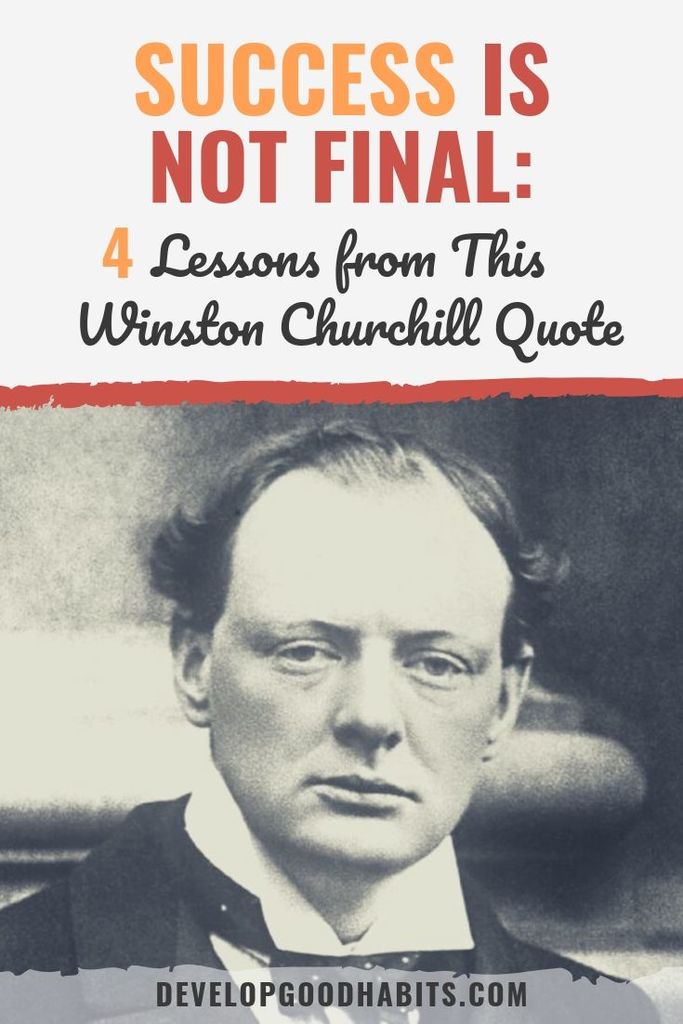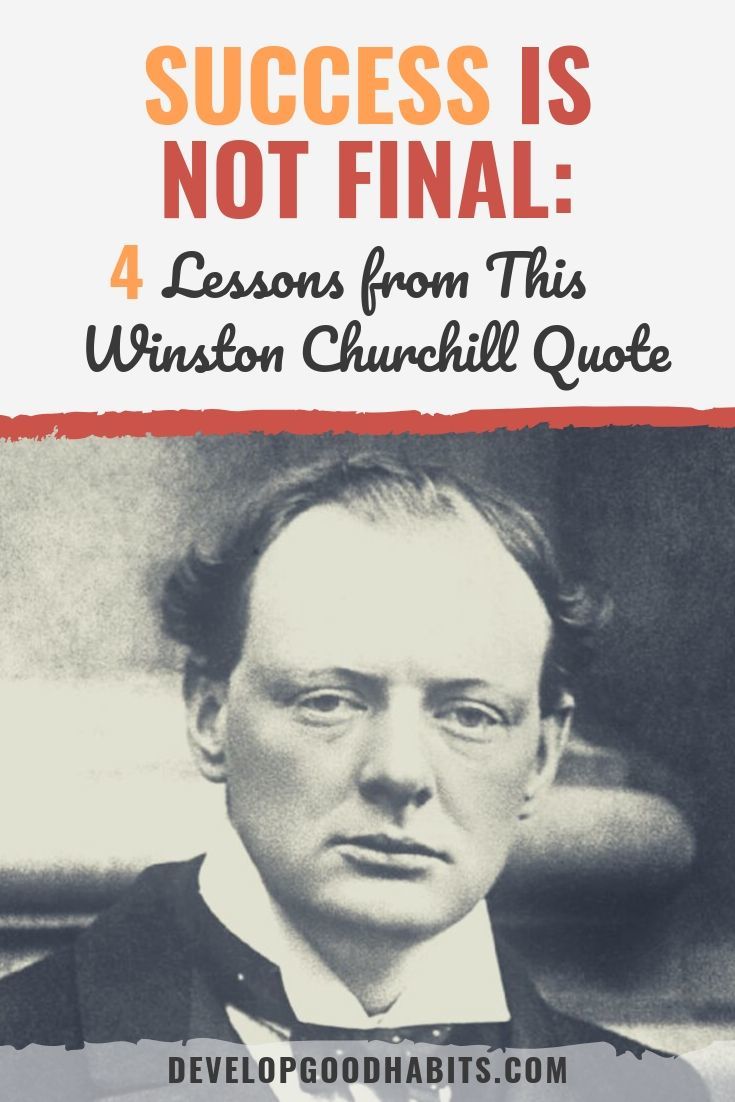Winston Churchill Courage to Continue That Counts
There might be affiliate links on this page, which means we get a small commission of anything you buy. As an Amazon Associate we earn from qualifying purchases. Please do your own research before making any online purchase.
"Success is not final, failure is not fatal: it is the courage to continue that counts." – Winston Churchill
There are a variety of sources who have been credited for saying these words, from a poet in 1905 to a medical doctor in 1920–and even a Budweiser campaign in the 1930s. However, by the 1960s, this quote was generally accepted as originating with Winston Churchill.
Churchill spoke a lot about success during his career, with a large focus on persistence and determination. In a 1946 commencement speech Churchill gave at the University of Miami, he spoke about how poorly he did in school as a child, yet how many degrees he ended up earning in his adulthood. He went on to tell the graduates that his success shows that with perseverance, those who feel like they're failing should not be discouraged.
Rather, they should be diligent in their pursuits, and with determination, they can ultimately achieve their goals. Because the truth is, any goal that is worth pursuing is going to end in multiple failures before success is finally achieved.
In this article, we will explore this quote further, focusing on the indefinite nature of success and the importance of never giving up. Here are four lessons that anyone can take away from this Winston Churchill quote.
What You Will Learn
- 4 Lessons from to Learn from the Quote, "Success is Not Final"
- 1. Failure is a prerequisite to success.
- 2. Learn from your mistakes.
- 3. Be courageous.
- 4. Never stop improving.
- Final Thoughts
4 Lessons from to Learn from the Quote, "Success is Not Final"
1. Failure is a prerequisite to success.
I know there have been times in the past when I failed at something and decided on the spot that the challenge just wasn't up my alley and since I couldn't do it, I quit. For example, I was on the dive team when I was a teenager, and one of the dives we had to do in dive meets was a front one-and-a-half somersault pike.
I tried a maximum of three times before declaring defeat with this dive, as I could only do a front one-and-a-quarter somersault pike (i.e. a flip + a belly flop). I figured I was just "one of those people" who couldn't make the full 540 degree turn.
But what if I had treated my first attempts as an opportunity to learn what not to do? What if I had been able to overcome the negative emotions of being the only person who couldn't do that dive and allowed my mistakes to fuel my fire to achieve success?
In this example, I saw failure as being fatal and I gave up. But I assure you, if I had kept practicing and aiming toward excellence, I would have been able to complete that dive.
This same principle applies to any challenge you're facing. You have to fail before you succeed. Otherwise, you won't learn from your mistakes, and what you think is success, might not be actual success. If I had made that full flip on my first try, no matter how out of control my body was during the progression of the dive, I probably would have thought I had succeeded.
However, I wouldn't have been aware of the mistakes I was making that prevented me from having proper form. This means that my idea of a "successful" 10/10 dive would have landed me about a 4/10 with the judges.
You have to learn through trial and error before you are successful. It doesn't come by blind luck.
2. Learn from your mistakes.
Churchill mentions "continuing" as being the main factor in achieving success. However, part of continuing isn't just starting over from scratch. You have to analyze what went wrong during your previous attempt and how you can remedy that for your next try.
For example, let's say you just went through yet another breakup. To you, your ex is just someone else you ended up dating who couldn't put enough effort into the relationship to make it work, which led to its ultimate failure. However, you also think the "next person" will be better. It's so easy to just blame someone else.
But if you have been through several failed relationships and continue to blame the other person for the ultimate demise, chances are you're not taking the time to analyze your mistakes in the relationship or try to understand what went wrong and modify your approach in the future to accommodate the errors.
With any goal you're attempting, you have to break down each mistake that you make to understand why it happened and how you can prevent it from happening in the future. This is the only way that you will perfect your method and reach your goal.
Once a bit of time has passed, evaluate what went wrong. Think about the timeline regarding events that lead up to the unwanted result in the end and consider what lessons can be taken away. Ask yourself, "Did one small mistake multiply into a much bigger mistake?" Or, "Is there a different way I could approach this challenge?"
Try to find the reason behind each failure–and if you do believe it was due to an external factor, consider how you will respond to that factor in the future.
But if you realize that you're able to take responsibility for the failure, you will gain more control over your life and your decisions in the future. If you can do this, sooner or later you will embrace failure, as you will see it as a learning opportunity that is bringing you one step closer to your reaching your goal.

3. Be courageous.
While it is much easier to choose to give up if you find yourself failing at something over and over again, you can't become defeated by your mistakes. When you look at successful people throughout history, most (if not all) went through an abundance of trial and error before becoming successful.
Take Thomas Edison for example. Before creating the lightbulb, Edison was actually thought to have been developmentally delayed as a child and his teachers often worried about his intellectual abilities. However, after finding "10,000 ways that [electricity] won't work" (– Thomas Edison), he became one of the greatest inventors of all time.
Having the courage to pick yourself back up after failing is paramount to ultimately realizing your dreams. We all go through times when moving forward seems impossible. When you feel like you've failed, it's tempting to choose to give up. But quitting too soon could prevent you from eventually achieving success. You never know which of your attempts will start to uncover progress if you have the courage to keep on going.
(Check out our post on the most inspiring movies about courage and bravery.)
4. Never stop improving.
So, you've achieved your goal. Great! Now what?
If you asked Winston Churchill, he would say you're not done.
There is really no concrete end to your success. Let's look at Bill Gates, for example. He established Microsoft, the most successful software company in the world, and became a billionaire by the time he was 31. But he didn't declare success at that point and call it a day.
He went on to develop Microsoft DOS, Windows, and The Bill and Melinda Gates Foundation to improve healthcare, education, and reduce poverty in third world countries…among other achievements along the way.
This same approach applies to you. Once you achieve the goal that you have set out to do, keep going. Build upon that goal or start something new to continue to improve yourself. Keep unlocking your potential and watch how far you can go.
Final Thoughts
It's important to realize that everyone fails in life…many times. But your obstacle to success isn't failure itself, it is your attitude surrounding failures and your willingness to pick yourself up and keep moving forward.
If you allow it to, your failures will initiate growth and maturity and help you gain new perspectives in ways that a success on your first try never could. I challenge you to take these lessons from Winston Churchill and try to accomplish something that you don't think you can do. Learn from your mistakes and build upon your successes. And, once you get the hang of what you're doing, keep going.
Finally, if you want to take your goal-setting efforts to the next level, check out this FREE printable worksheet and a step-by-step process that will help you set effective SMART goals .

Connie Stemmle is a professional editor, freelance writer and ghostwriter. She holds a BS in Marketing and a Master's Degree in Social Work. When she is not writing, Connie is either spending time with her 4-year-old daughter, running, or making efforts in her community to promote social justice.


Source: https://www.developgoodhabits.com/success-not-final/
0 Response to "Winston Churchill Courage to Continue That Counts"
Enregistrer un commentaire